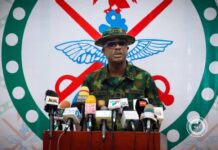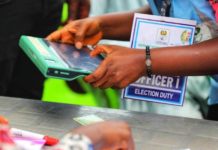The opposition party, the Peoples Democratic Party (PDP) Presidential Campaign Council has lambasted President Muhammadu Buhari over the latest poverty index report released by the National Bureau of Statistics (NBS).
NBS, in its latest National Multidimensional Poverty Index Report launched on Thursday, said 133 million Nigerians are multidimensionally poor.
In the report, the NBS said 63 percent of Nigerians are poor due to a lack of access to health, education, and living standards, alongside unemployment and shocks.
According to the Bureau, over half of the population who are multidimensionally poor cook with dung, wood, or charcoal rather than clean energy, adding that three out of five Nigerians live in poverty.
The report added that 86 million of the 63 percent live in the North, while 35 percent — nearly 47 million live in the South.
Reacting to the development on Thursday night, the PDP Campaign Council said the All Progressives Congress (APC) was leaving behind a huge record of grinding poverty due to the abysmal performance of President Buhari.
In a statement by one of its spokespersons, Phrank Shaibu, the council said the NBS report has underlined the fact that the number of Nigerians living in poverty under the Buhari government is alarming and calls for concern.
Shaibu asserted that Nigeria has become an autopilot as all the promises made by the ruling APC have not been achieved and described the APC as the master of failed promises.
The statement reads: “Today, the NBS said there are 63 percent of Nigerians are poor. This is because the APC has not been able to achieve any of its promises, seven and half years down the line.
“The APC government has no solution in hand for any of the problems plaguing the country. From kidnapping to banditry, prostrate economy. The APC government is full of hot air that contains nothing. You cannot give what you don’t have.
“Included in this troubling reality is that over 23 million youths, mostly educated and potentially productive, are unemployed. This development portends only one thing: a threat to the security and stability of the Nigerian nation.
“From the monetary perspective, the Central Bank of Nigeria, whose job it is to check inflation claims that it is doing its best to ensure that the overall prices for goods and services remain low, stable, and predictable even as records on the ground point to the contrary.
“Although the Buhari administration claims to be empowering potential investors; big and small so as to improve people’s lives, records show that 54.7 percent of Nigerians are financially excluded due to low-level bank penetration in the country and that besides the 916 Microfinance Banks, the 24 ‘big banks’ have only a little over 6000 branches, mostly concentrated in a few urban centers.
To worsen matters, the social safety net scheme introduced by the federal government in 2016, to tackle poverty and hunger has not made any significant impact owing to poor implementation, corruption allegations, and politicization.
“Only a sensible government will reckon that by redirecting public expenditure away from recurrent expenses and unnecessary consumption back to capital projects, the government can have a positive impact on incomes and employment.
“Such newly-employed individuals can in turn pay their bills, rent, and essentials, thus providing income to the farmers, herdsmen, landlords, and the like.
“Industrial policy, the kind that is encapsulated in Alhaji Atiku Abubakar’s blueprint, is another area to concentrate on.
“A nation of 200 million people cannot abandon its manufacturing sector in favour of importation. We must ensure that most of what we eat, drink, wear or otherwise use on daily basis are locally produced, thereby creating local employment and saving foreign exchange.”






































